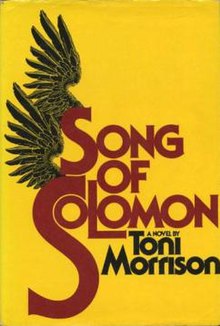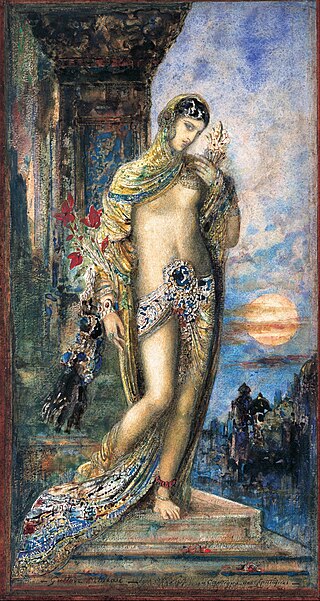
The Song of Songs, also called the Canticle of Canticles or the Song of Solomon, is an erotic poem, one of the five megillot ('scrolls') in the Ketuvim ('writings'), the last section of the Tanakh. It is unique within the Hebrew Bible: it shows no interest in Law or Covenant or the God of Israel, nor does it teach or explore wisdom like Proverbs or Ecclesiastes ; instead, it celebrates sexual love, giving "the voices of two lovers, praising each other, yearning for each other, proffering invitations to enjoy".
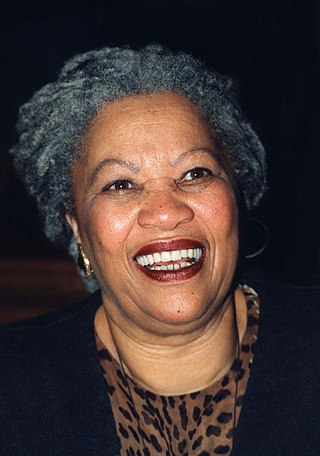
Chloe Anthony Wofford Morrison, known as Toni Morrison, was an American novelist. Her first novel, The Bluest Eye, was published in 1970. The critically acclaimed Song of Solomon (1977) brought her national attention and won the National Book Critics Circle Award. In 1988, Morrison won the Pulitzer Prize for Beloved (1987); she was awarded the Nobel Prize in Literature in 1993.

The Color Purple is a 1982 epistolary novel by American author Alice Walker which won the 1983 Pulitzer Prize for Fiction and the National Book Award for Fiction.

Van Halen was an American rock band formed in Pasadena, California, in 1973. Credited with restoring hard rock to the forefront of the music scene, Van Halen was known for their energetic live performances and for the virtuosity of its guitarist, Eddie Van Halen. The band was inducted into the Rock and Roll Hall of Fame in 2007.

Sarah is a biblical matriarch, prophetess and major figure in Abrahamic religions. While different Abrahamic faiths portray her differently, Judaism, Christianity, and Islam all depict her character similarly, as that of a pious woman, renowned for her hospitality and beauty, the wife and half-sister of Abraham, and the mother of Isaac. Sarah has her feast day on 1 September in the Catholic Church, 19 August in the Coptic Orthodox Church, 20 January in the LCMS, and 12 and 20 December in the Eastern Orthodox Church.

According to the Book of Genesis, Hagar was an Egyptian slave, a handmaiden of Sarah, whom Sarah gave to her own husband Abram as a wife to bear him a child. Abraham's firstborn son, through Hagar, Ishmael, became the progenitor of the Ishmaelites, generally taken to be the Arabs. Various commentators have connected her to the Hagrites, perhaps claiming her as their eponymous ancestor. Hagar is alluded to, although not named, in the Quran, and Islam considers her Abraham's second wife.

The Dead Milkmen is an American punk rock band formed in 1983 in Philadelphia. Their original lineup consisted of vocalist and keyboardist Rodney Linderman, guitarist and vocalist Joe Genaro, bassist Dave Schulthise and drummer Dean Sabatino.
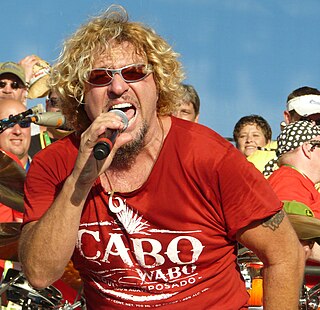
Sam Roy Hagar, also known as the Red Rocker, is an American singer, songwriter, and guitarist. He rose to prominence in the early 1970s with the hard rock band Montrose before launching a successful solo career, scoring a hit in 1984 with "I Can't Drive 55". He enjoyed further commercial success when he replaced David Lee Roth as the lead vocalist of Van Halen in 1985, but left in 1996. He returned to the band from 2003 to 2005. In 2007, Hagar was inducted into the Rock and Roll Hall of Fame as a member of Van Halen. His musical style primarily consists of hard rock and heavy metal.

Beloved is a 1987 novel by American novelist Toni Morrison. Set in the period after the American Civil War, the novel tells the story of a dysfunctional family of formerly enslaved people whose Cincinnati home is haunted by a malevolent spirit. The narrative of Beloved derives from the life of Margaret Garner, an enslaved person in the slave state of Kentucky who escaped and fled to the free state of Ohio in 1856.

Ronald Douglas Montrose was an American guitarist who founded and led the rock bands Montrose and Gamma. He also performed and did session work with a variety of musicians, including Van Morrison, Herbie Hancock, Beaver & Krause, Boz Scaggs, Edgar Winter, Gary Wright, The Beau Brummels, Dan Hartman, Tony Williams, The Neville Brothers, Marc Bonilla and Sammy Hagar.
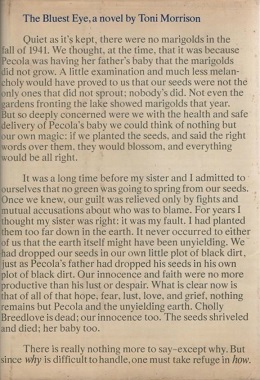
The Bluest Eye, published in 1970, is the first novel written by Toni Morrison. The novel takes place in Lorain, Ohio, and tells the story of a young African-American girl named Pecola who grew up following the Great Depression. Set in 1941, the story is about how she is consistently regarded as "ugly" due to her mannerisms and dark skin. As a result, she develops an inferiority complex, which fuels her desire for the blue eyes she equates with "whiteness".

A Period of Transition is the ninth studio album by Northern Irish singer-songwriter Van Morrison, released in 1977. It was his first album in two-and-a-half years. At the time of its release it was received with some disappointment by critics and fans: "Most were hoping for a work of primeval vocal aggression that would challenge the emerging élite of Morrison pretenders, whose ranks included Bruce Springsteen, Bob Seger, Phil Lynott, Graham Parker and Elvis Costello." However, the album is still notable for several major compositions, including "Heavy Connection", "Flamingos Fly", "The Eternal Kansas City" and "Cold Wind in August".

Tar Baby is a 1981 novel by the American author Toni Morrison, her fourth to be published.
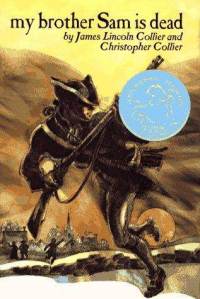
My Brother Sam Is Dead is a 1974 young-adult historical fiction novel by James Lincoln Collier and Christopher Collier. The book takes place in Redding, Connecticut during the American Revolution, and is told from the perspective of a young boy, Tim Meeker. The novel details Tim's brother, Samuel, and his desire to fight for the Patriots, despite his father's opposition to the war. Ultimately, Tim is forced to decide between siding with his brother and joining the colonies’ war efforts, or abiding by his father's anti-war wishes.
A guitar is a fretted and stringed musical instrument.

Love (2003) is the eighth novel by Toni Morrison. Written in Morrison's non-linear style, the novel tells of the lives of several women and their relationships to the late Bill Cosey.

The Best of Everything is a 1959 American drama film directed by Jean Negulesco from a screenplay by Edith Sommer and Mann Rubin, based on the 1958 novel of the same name by Rona Jaffe. It stars Hope Lange, Stephen Boyd, Suzy Parker, Martha Hyer, Diane Baker, Brian Aherne, Robert Evans, Louis Jourdan, and Joan Crawford. The film follows the professional careers and private lives of three women who share a small apartment in New York City and work together at a paperback publishing firm. Alfred Newman wrote the musical score, the last under his longtime contract as 20th Century-Fox's musical director.
"Rivers of My Fathers" is a song by American vocalist Gil Scott-Heron and keyboardist Brian Jackson. It was written and composed by Scott-Heron and Jackson for their first collaborative album, Winter in America (1974). The song was recorded on October 15, 1973 at D&B Sound Studio in Silver Spring, Maryland and produced by Scott-Heron and Jackson with assistance from engineer Jose Williams.

Shalimar is a perfume originally created by Jacques Guerlain in 1921 for French perfume and cosmetics house Guerlain. In production continuously since 1925, Shalimar is currently a flagship product for Guerlain.

Home is the tenth novel by the American author Toni Morrison, originally published in 2012 by Alfred A. Knopf. Set in the 1950’s, Morrison's Home rewrites the narrative of the time period. The novel tells the story of twenty-four year old war veteran Frank Money as he navigates America admidst his trauma from serving in The Korean War. After receiving a letter that alerts him of the danger his younger sister, Cee, has found herself in, he sets out on a journey back home to Lotus, Georgia.
